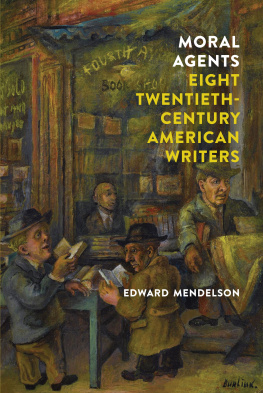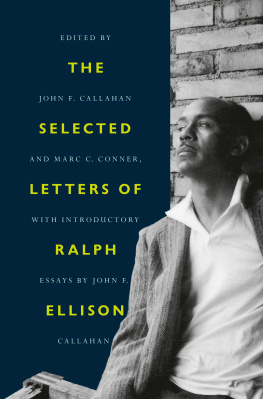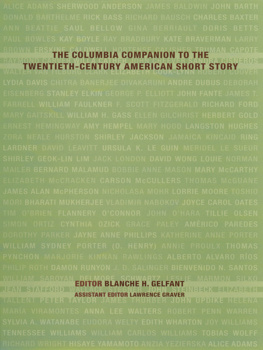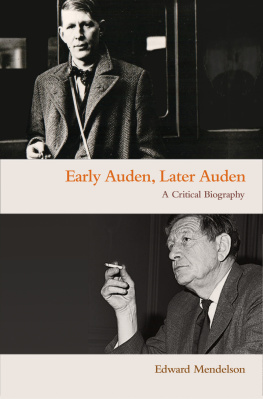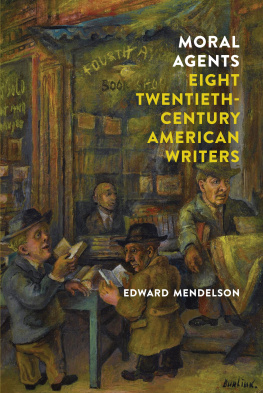Moral Agents
Eight Twentieth-Century American Writers
Edward Mendelson
NEW YORK REVIEW BOOKS

New York
THIS IS A NEW YORK REVIEW BOOK
PUBLISHED BY THE NEW YORK REVIEW OF BOOKS
435 Hudson Street, New York NY 10014
www.nyrb.com
Copyright 2015 by Edward Mendelson
All rights reserved.
Cover art: David Burliuk, A Bookstore; courtesy of the Burliuk Foundation, www.davidburliuk.org
Cover design: Eileen Krywinski
Library of Congress Cataloging-in-Publication Data
Mendelson, Edward, author.
Moral agents : Eight Twentieth-Century American writers /
by Edward Mendelson.
1 online resource.
Includes bibliographical references.
ISBN 978-1-59017-806-5() ISBN 978-1-59017-776-1 (print)
1. American literature20th centuryHistory and criticism.
2. Literature and history
United StatesHistory20th century. 3. United StatesIntellectual life20th century. I. Title.
PS221
810.9'005dc23
2014036790
ISBN 978-1-59017-806-5
v1.0
For
Robert B. Silvers
Contents
Preface
THE DEDICATION OF this book is literally accurate. I wrote these essays, in their original form, because Robert B. Silvers commissioned them for The New York Review of Books. My knowledge that he would read them provided much of the challenge and pleasure of writing them.
After completing two or three, I realized that they were beginning to shape themselves into a book, and I wrote the rest with something like this book in mind. In rewriting and rearranging, I have dropped almost everything in the originals that served as a review of a biography, edition, or critical study, and I have added much new material. Some of the chapters weave together material from two separate essays about the same author into a single narrative, and the introduction includes some paragraphs adapted from yet another piece I wrote for the Review. Every page has benefited from the vast learning, sharp eye, and profound good sense of Edwin Frank at New York Review Books.
All writers maintain a list of readers, not all of them still living, whom they most hope to please. At the head of my list, in alphabetical order, are David Bromwich, Barbara J. Fields, the shade of the late Frank Kermode, Cheryl Mendelson, and James Mendelson.
Introduction
THIS IS A book about writers, morality, and power. It tells the story of eight twentieth-century novelists, poets, and critics who, in addition to practicing their craft, seized for themselves the power and authority to shape American literary culture. Some exercised their power as public intellectuals whose writings influenced the national agenda. Others worked unobtrusively as editors who imposed their taste on an audience that was largely unaware of them. All had mixed feelings about their own power, and each confronted moral tests and temptations that were inseparable from it. Each of the eight chapters tells the story of one writers response to those tests.
The word moral embarrasses otherwise intelligent readers who imagine it has something to do prohibitions, social codes, or supernatural decrees. In fact morality concerns the effect of ones thoughts and acts, for good or ill, on others and oneself. It is a matter of the inner logic of actions and consequences, not of precepts and rules. It is descriptive, not prescriptive, in the way that the laws of thermodynamics are descriptive; however, ones actions may be guided, in part, by an understanding of morality in much the same way that a knowledge of the basic laws of physics may persuade you that it is preferable to walk down the stairs than to jump out the window. As in most realms of action, definitions tend to falsify; morality is a matter of what one does, not what one is. The clearest statement of this view of morality is Thucydides history of the Peloponnesian War. As Thucydides portrays them, acts of vengeance, capital punishment, and imperialist war are all self-defeating, not because they are punished by fate or the gods, but because they bring about their own failure, always foreseeable by those who have some moral sense, always denied by those who imagine themselves exempt from moralitys logic. All societies try to translate morality, with varying degrees of unsuccess, into codes of law and conduct, but those codes inevitably lack the inner logic and coherence of morality itself.
A few years ago I wrote a book titled The Things That Matter, about seven novels from Frankenstein to Between the Acts. All five authors that I wrote about in that book were women. All eight authors in this one are men. The choice of authors in each case has nothing to do with any homogenizing fantasy that women and men have different essential qualities, or that one category is inherently deeper and wiser about one or another aspect of experience. In both these books, the selection of authors deliberately reflects nineteenth- and twentieth-century social realities that were the product of stereotyping and prejudice.
The unifying theme of The Things That Matter was individuality, and its subject matter was the unique inner life of individual persons. All five of the novelists in that bookMary Shelley, Emily and Charlotte Bront, George Eliot, and Virginia Woolfknew they would be stereotyped as women writers, resented the stereotype, and rebelled against it by insisting on the unique meaning and value of individual life. This new book is a sequel to the earlier one, and it has a double focus on the inner life and the life of the political and cultural marketplace. Its subject matter is the effect of power on both private and public experience, and it describes a specific literary culture in which power was available only to men. Women writers from Katherine Anne Porter through Mary McCarthy to Sylvia Plath could be celebrated for their womanly insights but only if they held back from social and political subjects reserved for menalthough an anthropologist like Margaret Mead was tolerated for her knowledge of powerless cultures far from the American empire. (The same tolerance extended to child psychologists and other experts in powerlessness.) One recurring episode in this book is the hate-campaign mounted against Hannah Arendt after she discredited many conventional pieties in Eichmann in Jerusalem in 1963, a campaign that would have been far more cautious had the book been written by a man.
This book, like its predecessor, is concerned with individual persons, but it focuses on the conflicts between the inward, intimate private lives of its eight authors and the lives they led in public, the choices they continually made between wearing a mask and exposing their face. Some wore masks of exemplary rectitude, others wore equally artificial masks of wickedness, but all were troubled by the discordance between a mask and a face.
The oldest of these eight authors, Lionel Trilling, was born in 1905, the youngest, Frank OHara, in 1926. All knew most or all of the others. The first to publish a book with a commercial press was W. H. Auden, in 1930; the last was Norman Mailer, in 2007. For much of their lives, all lived and worked in New York, the capital of twentieth-century American literary and artistic culture. Dwight Macdonald edited his magazine Politics, with its worldwide influence, from his apartment in New York; William Maxwell shaped the dominant style of American novels and stories from his office as fiction editor of The New Yorker

